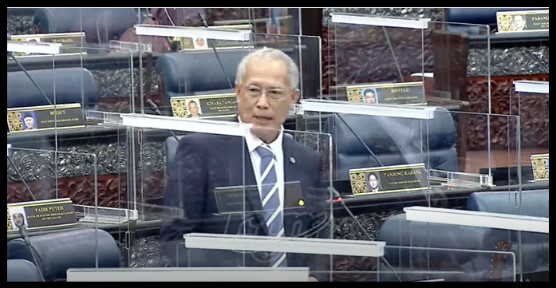KUALA LUMPUR, Nov 13 — Subang MP Wong Chen expects Malaysian life to return to normality only towards the end of next year, assuming the government purchases sufficient Covid-19 vaccines early.
The PKR lawmaker said the likeliest scenario was approval of four to six vaccines in the first quarter of 2021. The process of vaccine production, procurement, distribution, and inoculation will take at least six months after that, right until the end of the third quarter of next year.
“If we are lucky, and we can buy the vaccine earlier and adequately, we will be able to curb this pandemic in the fourth quarter of 2021,” Wong said during his debate on Budget 2021 in Parliament yesterday.
“From there, we will see social and economic activity recover to normal, to the level before Covid-19, that is 2019. Therefore, the 2021 Covid-19 Budget must be drafted specifically by taking into account this scenario.”
“We must be vigilant for at least the first nine months of 2021, when the Covid-19 pandemic will still pose a huge threat.”
Wong Chen, Member of Parliament for Subang
Wong pointed out the challenges that will be seen in obtaining a Covid-19 vaccine. Firstly, although US pharmaceutical company Pfizer Inc and partner BioNTech, a German biotech firm, have claimed their two-dose vaccine to be 90 per cent effective in preventing symptomatic Covid-19 infection, based on interim results of its Phase 3 study, like all other candidate vaccines, it has not been approved yet.
“Many health specialists have made a prediction that the Pfizer-BioNTech vaccine will be approved in the middle of next month, which is, with permission, approved before Christmas, but this vaccine needs a storage of -80 degrees’ Celsius. This will complicate storage, distribution, and inoculation work,” Wong stressed.
Dr Anthony Fauci, the United States’ leading infectious disease official, was quoted saying that if the US’ Food and Drug Administration (FDA) gave the Pfizer vaccine emergency-use authorisation (EUA), the first doses of the vaccine could be distributed to high-priority individuals, such as health care providers, as early as next month. An EUA is different from full FDA approval. The world typically looks at the US FDA and the European Medicines Agency for approved medicines or vaccines.
Health director-general Dr Noor Hisham Abdullah said Tuesday that Malaysia would first need to review Phase 3 clinical trial data on Pfizer’s Covid-19 vaccine before deciding on whether to procure it.
Wong also told the Dewan Rakyat yesterday that pharmaceutical companies like Pfizer do not have the capacity to produce billions of vaccine doses that are needed for the whole world. He said even Sinopharm, a state-owned pharmaceutical company in China, which is currently conducting its third phase clinical trials on two Covid-19 vaccine candidates, has the capacity of producing only one billion doses of its two vaccines next year.
“This world has 7.7 billion human beings and each one needs two doses of vaccines.”
Not all Covid-19 vaccines in Phase 3 clinical trials are two-dose regimens. Johnson & Johnson’s single-shot Covid-19 vaccine candidate is expected to produce results in its Phase 3 study by year end or early next year, Reuters reported.
Hence, Wong said although a Covid-19 vaccine is predicted to be approved by next year, there will be issues on production, supply and demand, issues on which countries should get the vaccine first, money and cost, distribution, logistics, and inoculation that have to be overcome.
The Independent reported yesterday that Pfizer has already sold 82 per cent of its Covid-19 vaccine stocks to among the world’s wealthiest nations, just two days after the company’s press release on the interim data of their vaccine. Pfizer and BioNTech reportedly plan to manufacture 1.3 billion doses throughout next year, but most have already been pre-ordered by the United Kingdom, the US, the European Union (EU), and Japan that purchased hundreds of millions of doses between them.
According to the British newspaper, the US can get up to 600 million doses under an agreement with Pfizer. The UK has pre-ordered 40 million doses, while the EU and Japan have snapped up 300 million and 120 million shots respectively.
How Many Malaysian Citizens Will Get Vaccinated?

At the same time, Serian MP Richard Riot Jaem (GPS), during his debate on Budget 2021 in Parliament yesterday, asked the government how many citizens in Malaysia will get the Covid-19 vaccine from the RM3 billion allocation for it next year.
“From the RM3 billion, how many hundreds, thousands, millions of Malaysian citizens will benefit from the purchase of the vaccine, which I said earlier is the cure for Covid-19?”
A Covid-19 vaccine isn’t a medicine, or a cure for the disease. A vaccine simply prevents infection. STAT reported that because Pfizer’s Covid-19 vaccine has been studied for only a few months, it is unclear how long the vaccine can protect against the viral infection. Pfizer’s study results have also not been peer-reviewed.
Science, Technology and Innovation Minister Khairy Jamaluddin reportedly said last month that frontliners would be at the front of the queue for a Covid-19 vaccine, such as health care workers, social workers, teachers, and police officers, as well as individuals deemed to be high-risk, like those with underlying medical conditions, such as diabetes, or lung or heart disease. He estimated that 3 per cent of the population would be immunised in the first round of vaccines.
Riot said if the RM3 billion isn’t enough, then the government should add more allocation into the vaccine budget. The Sarawakian MP also acknowledged the government’s efforts in joining COVAX, the global vaccine access plan co-led by the World Health Organization.
Under Budget 2021, Finance Minister Tengku Zafrul Aziz announced that the government has allocated RM3 billion to procure a Covid-19 vaccine. However, it was pointed out by two MPs, including Opposition Leader Anwar Ibrahim, that the RM3 billion allocation was nowhere to be seen in the budget document and not under any ministry.
Although the government announced that Malaysia is joining the COVAX Facility to procure a Covid-19 vaccine, it was noted by CodeBlue that Malaysia has yet to be listed under the participating country list, which was last updated on October 29.
Moreover, Prime Minister Muhyiddin Yassin also told a press conference in October that Malaysia had a virtual bilateral discussion with China’s Foreign Affairs Minister for cooperation in getting China’s assistance in providing Covid-19 vaccine supplies. Muhyiddin said back in October that he hopes by the end of the year, Malaysia will be able to get access to the vaccine after third phase testing is done.








